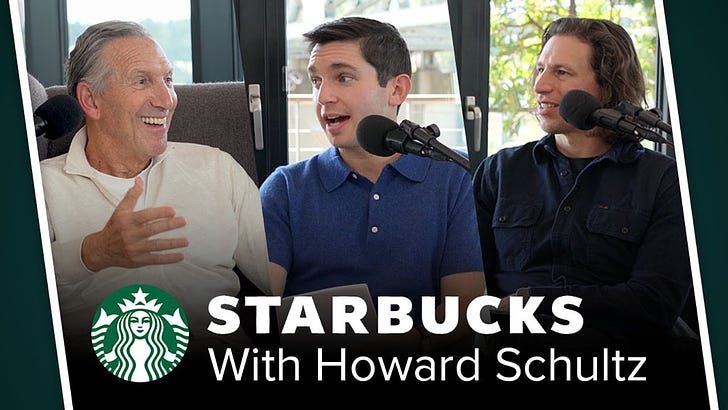On the latest episode of the Acquired Podcast, they interview the former CEO of Starbucks, Howard Schultz.
One idea that really stands out throughout the interview is Schultz’s belief that doing the right thing for Starbucks the brand rather than doing the right thing for Starbucks the stock — would eventually translate to long-term enterprise value for the company:
“The shareholder is not the primary person. It’s the Starbucks partner in the green apron, which is the cloth of the company. If we exceed the expectations of the cloth of the company and our people, shareholders and customers are going to win. That’s been my whole life story.”
Schultz’s model essentially boils down to a flywheel: the company revolves around world-class customer experiences. To achieve this, Starbucks needs to invest in its coffee and its people. In turn, these lead to world-class customer satisfaction, resulting in world-class sales, and thus world-class shareholder returns.
The altruist effect of this strategy should not be downplayed. Starbucks was one of the first public companies to offer an equity plan to all of their employees. They also offered free healthcare (even to part-time employees!) and scholarships to their store associates. There may not be another company in the history of capitalism that has done as much for the lower and middle-class worker than Starbucks (even though my fellow Vermonter Bernie Sanders would have you think otherwise).
There’s the famous Benjamin Graham quote that, “in the short-term, the stock market is a voting machine, in the long-term, it’s a weighing machine.” The principle here is that in the short term, stocks are more volatile and subject to sentiment and human nature, but on a longer time horizon (10-30 years) the underlying value of a stock is far more likely to reveal itself.
The problem is when you focus on the short-term — when you make the shareholder the primary priority — you start to make decisions that can save you a few percentage points of EPS in a quarterly earnings call which will benefit your stock today. (In the case of Starbucks, they decided to start skimming an ounce or two off of every cup of coffee they poured.) However, these types of decisions ultimately will do damage to the brand and thus make the true value of your company deteriorate.
In 1997, Bezos (who, like Schultz started his business in Seattle [and, like myself, frequently quotes Ben Graham]) wrote in an annual shareholder letter “we will continue to make investment decisions in light of long-term market leadership considerations rather than short-term profitability considerations or short-term Wall Street reactions.”
The beauty of this statement is that it’s flipping the assumptions of the conversation on its head. Bezos is laying it out clearly for investors: “We are focussed on the long-term. If you’re along for the ride, we’re happy to have you. If you’re here for an immediate “dopamine” bump in your portfolio, Amazon is not your company.”
Perhaps this insight is a bit obvious: “do the right thing rather than the expedient thing.” But time and time again, we see a tendency to revert to expedience. And going back to the altruism point, the implications of this philosophy are especially profound with regard to the ongoing “Stakeholder vs. Shareholder” debate of corporate governance.
Why is this philosophy not applied more? The examples in which we begin to see cracks in the molding are, I would argue, examples in which the system has been set up in such a way that you are disadvantaged for not focussing on the short-term:
Zero interest rate policy (ZIRP) — Zero Interest Rate Policy, a monetary policy tool used to stimulate the economy, unintentionally encourages short-term thinking by making borrowing cheaper and saving less attractive.
As a knock-on of this, trillions of dollars floated to private markets in the last several years — and subsequently many private companies today are having to take on additional rounds of venture dollars (that they may not necessarily need) out of fear of those dollars going to competitors instead.
Regulatory Capture — Regulatory capture occurs when governmental agencies that are supposed to regulate industries instead become dominated by the interests of the very entities they are meant to oversee. This phenomenon leads to state-sponsored monopolies and stifles competition, ultimately distorting market signals. When companies leverage their influence to shape regulations in their favor, it undermines fair competition and incentivizes short-term gains over long-term, sustainable growth.
As Bill Gurley famously lays out in his speech on regulatory capture, we saw this happen in Healthcare, when the electronic health records software EPIC (whose CEO was on the president’s Healthcare I.T. advisory board) lobbied to pass the HITECH Act. This bill funneled over $36 billion of government money into EMRs and encouraged hospitals to implement EMRs in exchange for taxpayer dollars. Almost overnight, the industry shifted to a tool that many would argue was unnecessary, chasing short-term gain.
All of these are examples of market signals becoming artificially distorted, and when this happens (especially in an inflationary environment) decisions tend to err more towards the short-term. And we see the side effects of that via growing inequality, lackluster corporate ethics, and governance (ironically, all the things the proponents of ZIRP and regulatory capture say they are against).
Like most things in business, we see this take place in life as well:
We use pharmaceuticals to solve short-term symptoms that don’t treat the underlying disease.
We commit to the newest unrealistic diet fad that gets us to lose 10 lbs in a month (which we will inevitably gain back) rather than committing to a sustainable, healthy lifestyle.
In politics, we make short-term promises that win votes but in turn, do irreparable damage to the health of our economy and communities.
More often than not, human nature is to abandon first principles and do the expedient thing rather than the right thing. How can we try to avoid this natural tendency?
One of my earliest bosses was really good at making this long-term orientation quantifiable — which made it easier for clients to wrap their heads around. Rather than laying out business plans on a quarterly basis, he would operate on a 2, 6, and 10-year window — and all of a sudden they became digestible and tangible.
This is not dissimilar to what Amazon and Starbucks do. Bezos, later in that 1997 shareholder letter, laid out the metrics Amazon would weigh itself against:
“We first measure ourselves in terms of the metrics most indicative of our market leadership: customer and revenue growth, the degree to which our customers continue to purchase from us on a repeat basis, and the strength of our brand”
And later…
“We will continue to measure our programs and the effectiveness of our investments analytically, to jettison those that do not provide acceptable returns, and to step up our investment in those that work best. We will continue to learn from both our successes and our failures.”
And even later…
“When forced to choose between optimizing the appearance of our GAAP accounting and maximizing the present value of future cash flows, we'll take the cash flows.”
Once again, I commend Bezos’ ability to fundamentally reframe the conversation around his priorities. If you can take the conversation and drag it up to the 10,000-foot level, and change the premises of the conversation like this — you can begin to prioritize decisions based on “weight” rather than “votes.”
I think it’s important, both in business and in life, to play to the weighing machine rather than the voting machine — because that’s where the sustainable, real value comes from.




